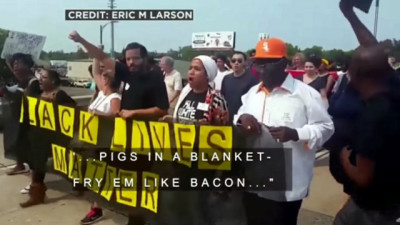“Black Lives Matter” activists are itching for a fight.
 The St. Paul, Minnesota chapter of the group has announced it will “shut down” a light-rail public transportation line shuttling fans to the first Minnesota Vikings home game this Sunday.
The St. Paul, Minnesota chapter of the group has announced it will “shut down” a light-rail public transportation line shuttling fans to the first Minnesota Vikings home game this Sunday.
“Sunday September 20th is the Minnesota Vikings’ home opener, big money day, so what better day to shut the light rail down and disrupt business as usual,” activists announced in a press release, Fox 9 reports. “Enough is enough of business as usual! We must bring an end to white supremacy and the status quo.”
The group is being very public about its intentions. They say they will be at the TCF Bank location at Lexington Parkway and University Avenue at 9 a.m. Kickoff is scheduled for noon.
At the protest, they will “talk about Autism, police brutality, and bringing an end to white supremacy.” They have not indicated how they will “shut down” service.
Activists claim on the group’s Facebook page, “This is a disciplined, peaceful protest against this injustice and all police excessive force.
“As a community we all know that autism is not a crime. … Come out and let your voice be heard in support of Marcus Abrams. We want those officers fired,” the Star Tribune reports.
The activists are upset about how the Metro Transit police treated a passenger. They say the protest will be the continuation of one held near the Minnesota State Fair.
That’s where they were caught on video chanting “pigs in a blanket, fry ’em like bacon” during the late August protest.
“Any city official claiming this march was a success or a positive example of people expressing their beliefs – remember, you represent me also. And if you think chants like this are appropriate – you disgust me,” St. Paul police union president Dave Titus said, according to KSTP.
Metro Transit police vow to protect the safety of the light-rail riders.
“We absolutely respect people’s desire and right to voice their viewpoints,” spokesman Howie Padilla tells the Pioneer Press. “Our priority is to ensure the safety of the communities we serve — the communities our trains and buses go through as well as the riders on our vehicles.”
Leave a Comment
COMMENTS POLICY: We have no tolerance for messages of violence, racism, vulgarity, obscenity or other such discourteous behavior. Thank you for contributing to a respectful and useful online dialogue.